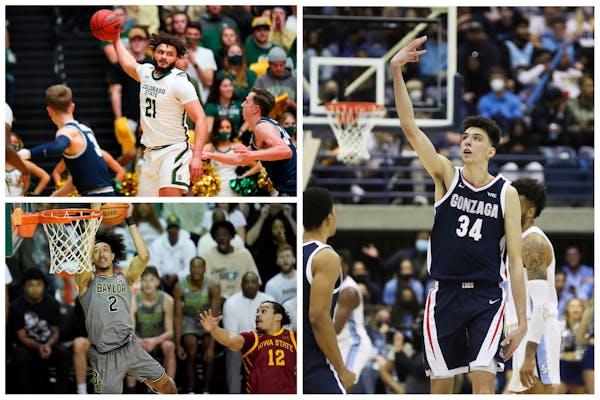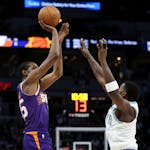New Timberwolves President Tim Connelly has been on the job for less than a month, but he is already arriving at the first crucial stretch of his tenure. The Wolves have four picks in Thursday's NBA draft, including No. 19 overall and three second-rounders.
After all the picks are made comes free agency, when the Wolves will have to address needs on the roster, including finding upgrades in the frontcourt to bolster their rebounding. Connelly chatted with the Star Tribune recently about all this. (Answers were edited for clarity and brevity.)
“There will be no decisions from this group that'll be made by individuals. It'll be made by the collection of colleagues.”
Q When you have a playoff team already and are building toward being a contender, how do you view an asset like the No. 19 pick? Does it become more valuable as a trade chip to find a veteran more ready to contribute?
A We'll beat up all the different possibilities pretty good. We're also very content and pretty excited about if we're going to get a good player at 19. It's going to be hard for any player we draft to have a huge role with the team that just had the success they had. We're not drafting for June 24, we're drafting for, hopefully, to add a person that can be a part of sustained success and a person who can grow into a role. I think things are on the table, but we do feel pretty convinced that 19 is going to yield a good player.
Q The eternal question is always do you draft for need or draft the best player available. How does need fit into the equation? More of a long-term need?
A I think I'm generally a best player available [guy]. When that becomes really close, then you have to factor in need. … Teams change so dramatically. Some of the times I've screwed up the most is when I was too tunnel-visioned trying to address needs and the team looks different two weeks later in free agency, looks different a year later after a trade. Then you look up and say, "I'm such a moron for not just taking the guy we had higher on the board. We liked him." I think generally, really good players find their way regardless of the roster. We'll be a best-player available team and if it's really close in the discussion, we'll be a bit more nuanced. I think generally, it's the best approach to take.
Q Karl-Anthony Towns is eligible for a supermax extension. How much thought have you given that? Do you envision him as a franchise cornerstone?
A I hope he's here forever. I hope we have the type of team success that would allow us to look up and see Karl's jersey being hung up in the rafters. I reached out to a bunch of these guys, but I don't want to force relationships. You have to develop those things naturally. So, I've heard so many great things about him. I know how great a player he is on the court, but off the court it's been so consistent, just an unbelievably sweet guy that treats everyone in a really classy manner. I think he's been through so much, so many different faces and different chairs, from the front office to the coaching staff. So I think with continuity with Finchy [coach Chris Finch], you're going to see a better version of Karl and he's already a great player. … I know he's good enough to win at a high-high level, and I know how much he cares about this city and this team, so I think that would be an unbelievably cool thing for Karl and this team that he only wears one jersey and we win a ton of games and we're old and fat and watch the jersey being hung in the rafters. I'm already old and fat, but older and fatter.
Q The most glaring need seems to be finding somebody to play in the frontcourt, get added rebounding. But when you sit back and evaluate the roster, what do you see?
A I think sitting down with Finchy, it's been great to hear what he thinks. There are a couple of areas we got to get better. We've got to get better defensively at the rim. We can't be a defensive rebounding team like we've been in the past. We've got to close possessions. The biggest defensive metric is closing possessions. Ending possessions. We don't want to be so solely focused on what we're not good at. I think this team has developed a pretty clear identity in terms of ball movement, length, athleticism, aggression. So we want to make sure those things are paramount that as we add, but every team has holes. Every team is going to try to plug those holes. But we have to be strategic in how we approach those things.
Q What are your impressions of Anthony Edwards?
A I'm a fan, first and foremost, and I love everything about his approach, his game. I just love how sincere he is. He's always himself. He's just such a joy to watch play. He's a joy to watch be interviewed. He's a joy the way he interacts with his teammates, how much he smiles and how much he enjoys the game. I think it's our responsibility to make sure he never loses that, while also challenging him to be the guy we all know he can be. The guy can be as good as anybody in the world. That type of talent, he's certainly got the winning DNA that we're all looking for. So, I just don't want him to ever lose that joy. It's pretty special to watch a person who's that comfortable in his own skin. We can't skip steps to be an elite team. He can't skip steps to being an elite player. But there is no limit on what he can do. He can be the best player in the world.
Q You mentioned at your press conference how you like everyone in a room to argue their points and come to a decision at the end of the process. How do you go about making the ultimate decision with all that input?
A It varies. Sometimes you got to make quick decisions. You don't have the luxury of taking your time, especially on draft night. You do all your planning and your board is wrong, so the guy you thought is going to go 14 just went 12. Now, where are you? So, I think the key is just being really convicted in the processes prior to the decision. I think there's some really, really smart people here that have already been hugely impactful in how I view this draft and free agency. ... You can't be scared to make a mistake. You can't be governed by fear. I've learned over the last X amount of years that you can't listen to too many outside voices outside this building. It's why I don't have any social media. It's true. No burner [accounts], nothing. … You don't want to be too jumbled with too many voices. So long answer, longer: you get around really smart people, beat up every possible scenario, get a sense of what you want to do. You hope that what you want to do is there. If you can't do it exactly like the way you had hoped, you have Plan B's and C's and feel good about those as well. Hopefully, we argue like crazy, respectfully, and challenge each other's opinions and once the door opens it's a "we" decision. No decisions from this group will be made by individuals. It'll be made by the collection of colleagues.



![Naz Reid (11) of the Minnesota Timberwolves Wednesday, March 27, 2024, at Target Center in Minneapolis, Minn. ] CARLOS GONZALEZ • carlos.gonzalez@](https://arc.stimg.co/startribunemedia/TGYNEKQCYNH5VEPCXSJODRMDDM.jpg?w=75&h=75&fit=crop&crop=faces)



